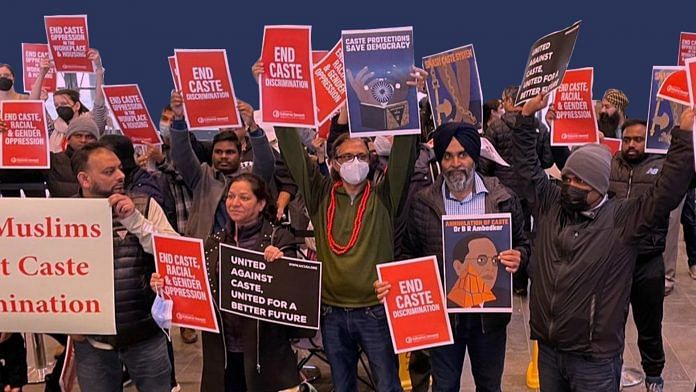The historic move by the first American city of Seattle to outlaw caste discrimination isn’t going to stop at just that. Revolution, disruption, anti-Hindu bigotry — call it what you will — this push is going to travel to other places in the United States.
India’s age-old fault line has gone global now. But this landmark 6-1 vote in the Seattle City Hall adding caste to the city’s anti-discrimination laws isn’t just all about India, Indians or Hinduism. This is a key part of the Great Culture War raging across the United States for some years now.
At the heart of this war is getting governments, schools, universities and corporations to acknowledge historic injustices as structural and not merely as episodic — whether it is race, gender or disability. This has to be seen in the wider context of the battle to teach critical race theory, which has become the central triggering point in classrooms, school boards and parent groups.
So, Seattle banning caste discrimination isn’t Hinduphobia. This is about the evolution of political thinking and social critique in Western scholarship and activism today. Let’s not dismiss it as woke ideas, like many do. It is far more serious than a fad among the young.
Also read: Don’t rush to cancel wokes in McCarthyist panic. Keep 5 things in mind
Dalits have joined caste Hindus in US
The Seattle City Council has signalled that caste discrimination crosses national boundaries. When historically privileged and dominant caste Hindus leave India, they carry their historical cultural currency with them too. Just like they carry their privileges. The new law recognises that the Dalits who travel to the United States don’t stop suffering from disadvantages and generational trauma either.
Indian students going to the United States have been rising and in recent years have overtaken even the Chinese. The US Mission in India issued a record-breaking 82,000 student visas until September 2022, higher than any other country.
The U.S. Mission in India has issued a record-breaking 82,000 #studentvisas in 2022 to date, higher than any other country. This shows that the U.S. remains the most sought-after country for higher education. pic.twitter.com/BBv8LZT7oo
— U.S. Embassy India (@USAndIndia) September 8, 2022
Harvard University scholar Ajantha Subramanian wrote a seminal book Caste of Merit on how the early waves of Indian migrants to the US were predominantly privileged castes. It is no coincidence that many of the first and second wave migrants would be bitterly critical of reservation policies back home in India, and often claimed pure merit as the sole basis of their success abroad — unaware if not wilfully dismissive that the tone-deaf word ‘merit’ itself is a product of social filtering and discrimination processes. And merit is not a sole monopoly of a caste group.
But as American universities begin responding to Dalit student groups and activists on issues of caste, it is evident that the Indian population there is diversifying. More Dalits are aspiring to the American Dream today.
Also read: More Dalit students going to Oxfords, Harvards. West now gets the caste divide
The Seattle move — and if more cities and states join in the coming years — will help Dalits also benefit from the affirmative action diversity pie when it comes to landing American jobs. Right now, most of these diversity hires, where Indians are hired, are cornered by privileged caste members. These are also the kind of people who like to say they don’t see caste or that caste discrimination is a thing of the past. They are unaware that caste-blindness is itself an act of privilege and amounts to denial of Dalit generational trauma.
More importantly, there are many privileged Hindus in America who say they don’t discriminate. Fair enough. But casteism, like racism, isn’t just about incidents of discrimination or oppression. It is structural and has seeped into people’s languages and cultures, social processes and institutions over time. Failing to recognise that can be construed as racism — according to current ways of thinking.
That, in short, is critical race theory. And that way of social critique is now being applied to understanding of caste in Harvard University, University of California (Davis), Colby College and Brandeis University. And now in Seattle.
Also read: ‘This is a tornado’—Hindu American Foundation wants people to care about Hinduphobia
Get on with the difficult conversation
Understandably, there is deep anxiety around this development. White parents on Fox TV raged against teaching critical race theory in classrooms. And now, some Hindu groups in the US are angry too. They say this can lead to Hinduphobia in the West.
Suhag Shukla, executive director of Hindu American Foundation, told me recently about how a young Hindu boy, born and raised in the US and having no knowledge or lived experience of caste, was asked by his school teacher about his caste and how Hindus treat Dalits. These, she said, are the kind of questions that come out of this push to introduce caste in American vocabulary. This, she added, can lead to bullying of Hindu students in American classrooms.
But these questions can also open up important conversations and channels of understanding in classrooms. Indians growing up in the US and studying in US schools can’t get triggered by difficult discussions about race. So they should ‘get with the programme’ on caste too. Shukla’s concerns are real. But so is casteism. Why run away from difficult conversations? Classrooms are, after all, safe spaces for precisely these kinds of difficult conversations. Not politics.
Rama Lakshmi is Editor, Opinion and Features at ThePrint. Views are personal.
(Edited by Prashant)



